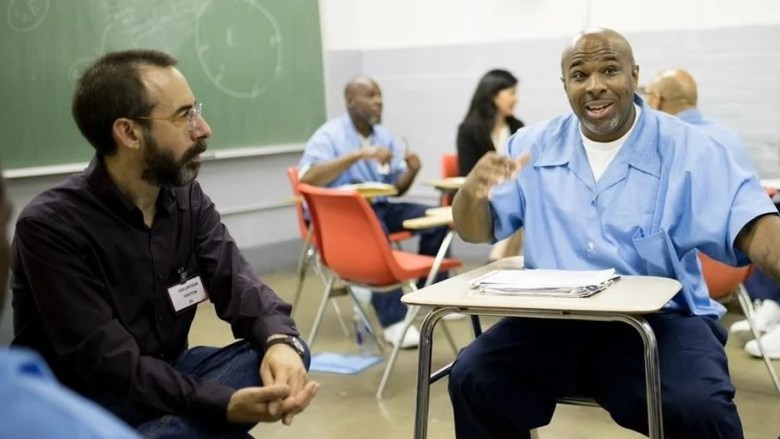Last September, at his graduation from Northwestern University, Michael Broadway reconnected with his mother, Elizabeth, for the first time in two decades. Due to her ailing health, she couldn’t visit him. As an incarcerated man, he didn’t have the option to travel to her, either.
For those two decades, Broadway was held inside Stateville Correctional Facility, a maximum security prison outside Chicago. It was there where he died last Wednesday, June 19, shortly after experiencing trouble breathing.
Broadway, who was asthmatic, died a month before his 52nd birthday.
Those incarcerated with Broadway and members of the nonprofit prison policy organization Parole Illinois allege that his death was the result of inhumane conditions at the facility: extreme heat, lack of ventilation, and inadequate access to health care.
Broadway’s attorney, Terah Tollner, said correctional officers “went about their business for far too long.” The facility’s medical staff, she said, was slow to reach Broadway because they, too, were struggling to handle the heat in the cell unit. Abdul Malik Muhammad, a man also held inside Stateville with Broadway, wrote to WTTW, a local news outlet, that at the time of Broadway’s death, windows throughout the facility were nailed shut with plywood due to structural damage.
Because the prison did not have a functioning stretcher, Broadway’s attorney says, close friends had to help carry him out of his cell in a bedsheet.
The Illinois Department of Corrections confirmed Broadway’s death in a statement to Capital B, but declined to comment further because of an ongoing investigation. For decades, however, these kinds of allegations have plagued the facility, which is set to close later this year.
Recently, a state review of the facility categorized the prison as “nearly inoperable” due to significant infrastructure problems, including leaks and poor ventilation. The review prompted Illinois advocates to file a legal petition with the U.S. Environmental Protection Agency this year to take emergency action against the prison to address failing infrastructure related to cooling and drinking water.
As very few states have institutionalized precaution tactics for people inside prisons and jails, Broadway’s life exemplifies how climate change, public health, and incarceration intersect. In times of extreme weather, there is no uniform policy guiding these facilities. It leaves those in charge of the facilities to come up with their own emergency response plans. Often, that means no precautions are taken, and when they are, they’re often patchwork attempts with few resources.
It’s a practice that David Pellow, director of the Global Environmental Justice Project at the University of California, Santa Barbara, has called an “amplified case of environmental racism because incarcerated folks are completely powerless.”
In particular, incarcerated people are at a disadvantage in surviving these weather events, whether heat or hurricanes, because they’re not in control of their ability to withstand or mitigate their impacts. For example, air conditioning, regarded as the most effective individual tool to combat heat, is largely absent from prisons; 44 states lack universal air conditioning in their prisons.
Over the past two decades, nearly 13,000 people have perished behind bars during America’s summer months. However, many of these deaths are not typically attributed to heat, the product of poor death-counting practices that have led to an undercount of heat-related deaths for decades.
Still, deaths have only become more commonplace as heat waves have spread across the country in record numbers over the past several years, disproportionately harming Black people on both sides of the bars.
The week of Broadway’s death, temperatures reached 97 degrees outside Stateville; An analysis by a nonprofit science group, Climate Central, found that climate change made the heat spell at least two times more likely.

Routinely, prisons and jails are placed in communities that struggle the most with heat due to concrete and a lack of green space. On average, communities where these facilities are located experience a week’s worth more of extreme heat days than communities where prisons aren’t located.
“A lot of these folks are coming from already environmentally toxic neighborhoods and then are being trapped in new environmentally toxic [facilities],” Pellow explained to Capital B. Most people, he said, “embrace” and shrug off “this disenfranchisement and environmental violence” because of negative feelings toward incarcerated people.
Read More: Across the Midwest, Counties Are Building New Jails on Toxic Land
The issue has especially taken root in Texas, where more than a dozen incarcerated people die from heat-related illnesses every year. The situation there has been so dire that the United Nations Convention Against Torture has censured the state’s penal system.
However, the crisis is felt nationwide, even in the historically cooler Northeast region where the Prison Policy Initiative found that deaths increase by around 21% from two-day heat waves. It’s also felt long after the heatwaves end; a 2023 study found prison suicide rates increase after heatwaves.
The death of Broadway, who battled prostate cancer, also illuminates how being incarcerated can intensify poor health. Studies show that incarceration places people at a higher risk for developing cancer, and these underlying health conditions make surviving extreme temperatures even more difficult.
“Devastating and preventable”
In 2006, Broadway was convicted of shooting and killing a man in Roseland, the South Side of Chicago community where he grew up. Over the past decade, roughly 120 people have been shot in the neighborhood every year.
But 17 years later, through a prison education program, Broadway was part of the first cohort of incarcerated students nationwide to earn a degree from a top-10-ranked U.S. university. There, he took courses like sociology and philosophy, which gave him the “terms and definitions to describe” his life experiences, he said.
The course that had the biggest impact on him was a sociology class taught by Mary Pattillo, one of the nation’s leading sociologists on race and inequality. The class showed him how to connect the dots between a lack of investment in his communities after deindustrialization. It “caused food deserts, underfunded schools, and healthcare decline,” Broadway wrote after completing the course. “The loss of jobs [that caused] home foreclosures, a rise in crime and drug use, which led to my community being over-policed and having its citizens harassed.”

Chloe Hilles, a Northwestern graduate who took a class with Broadway, wrote to Capital B on X, formerly Twitter. “I had the privilege of taking a philosophy course with Michael in college. It was an honor to learn with and from him – he’s a true philosopher,” she said. “It’s well known [that] Stateville has extreme temperature problems (heat and cold). This loss is devastating and preventable.”
Marlon Millner, the director of Northern Illinois University’s Center for Black Studies, also wrote to Capital B. The “most meaningful work” he’s done was teaching Broadway and his classmates, he said.
Broadway hoped to create a nonprofit organization focused on youth empowerment if given the chance of parole.
“I have no words for this, [it’s] otherworldly,” Broadway said after receiving his degree last year. “Coming from where I came from, the things that I’ve been through, and to be here is indescribable.”
This post was originally published on this site be sure to check out more of their content.








